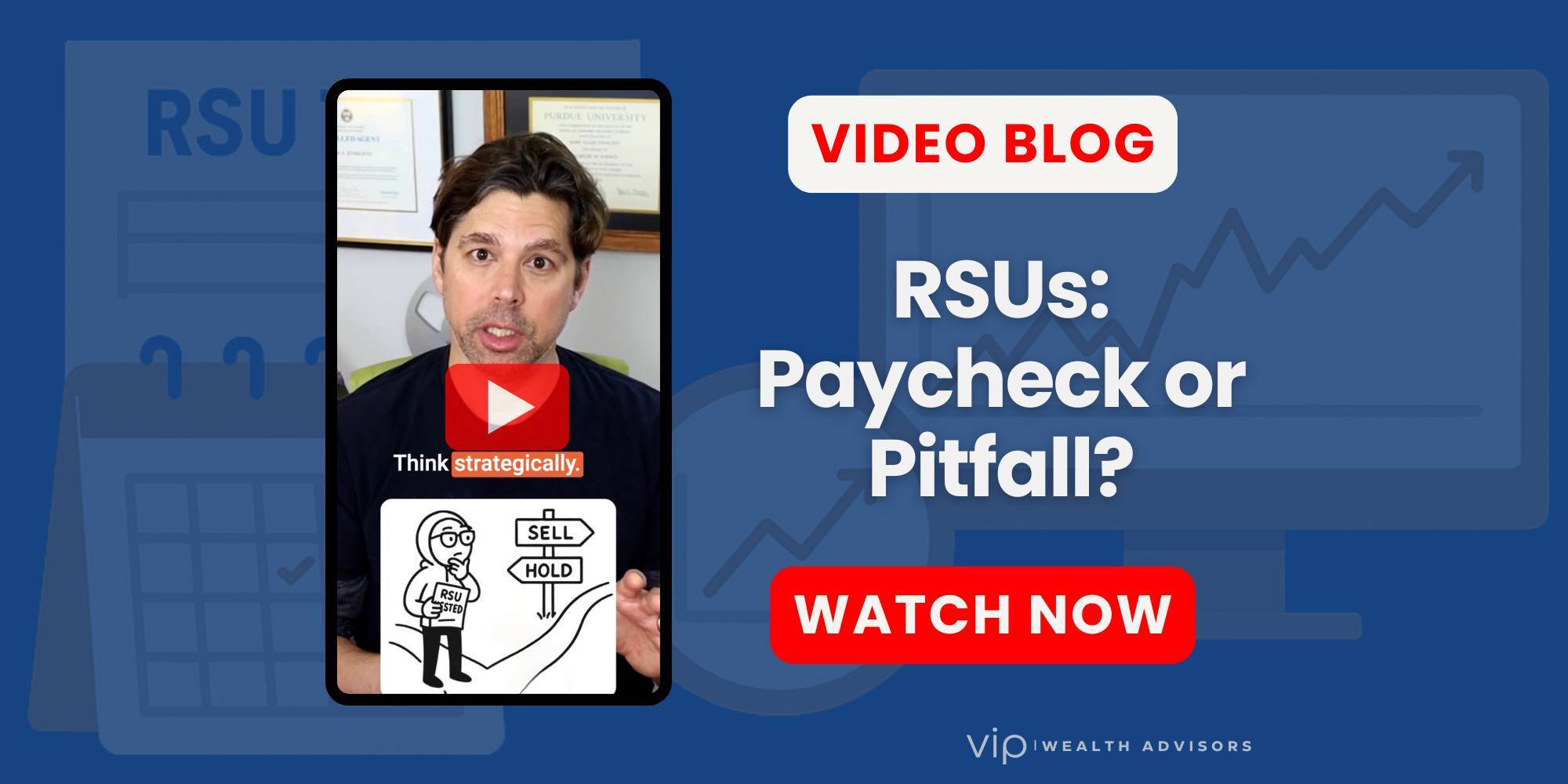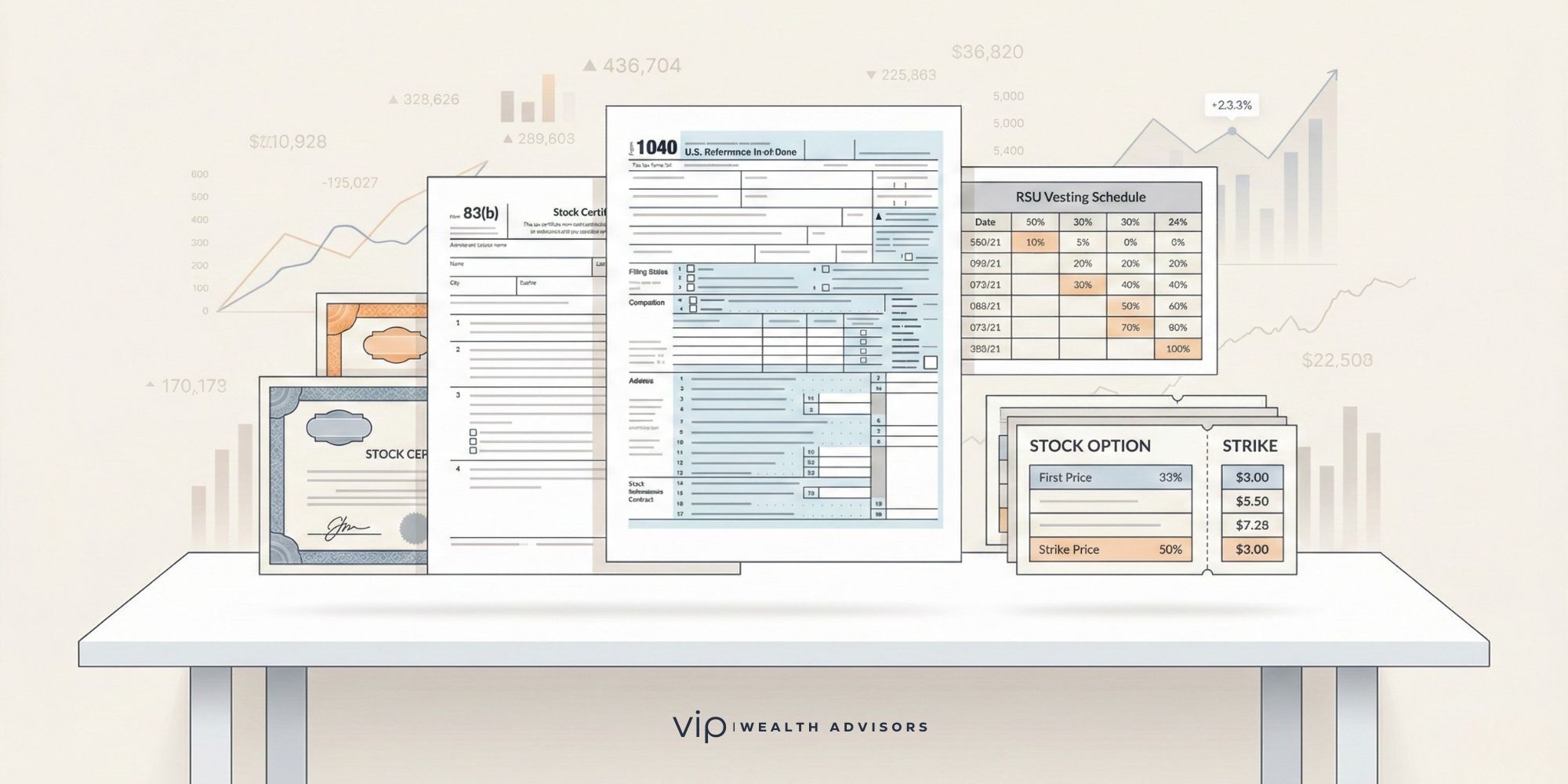Introduction: RSUs Aren't Compensation—They're a Tax Event You Didn't Choose
If you receive Restricted Stock Units (RSUs), chances are they show up in your mind as a reward. But here's the reality: RSUs are not a bonus or windfall. They're a stealth tax event baked into your W-2 income, often triggered without your consent, sometimes when you can't even sell the stock. And if you're a high earner at a pre-IPO or public tech company, the risks multiply fast.
At VIP Wealth Advisors, we delve deeper than simply advising clients to "hold or sell." We analyze every RSU grant through the lens of tax planning, cash flow management, and long-term wealth strategy. Here's what every tech professional and equity-compensated executive needs to understand before the next vesting date hits.
Section 1: What Are RSUs (Really)?
RSUs are deferred compensation, not a gift or bonus. When they vest, the value of the shares on that date is reported as ordinary income on your W-2. You owe taxes even if you never sell a single share.
Here’s how RSUs typically show up on your W-2:
- Box 1: Your total wages, including RSU income at vesting
- Box 12 (Code V): Reflects income from RSUs and NQSOs
- Box 14: Some companies break out RSU amounts here, too
Example: 2,000 RSUs vest at $150/share = $300,000 added to your W-2 in that year
This income is subject to:
- Federal income tax
- State income tax (if applicable)
- Social Security and Medicare (up to wage limits)
If you already earn a high salary, RSUs could cause you to enter a new tax bracket, phase out deductions, or trigger additional Medicare taxes.
Section 2: The Withholding Trap
The 22% Federal Illusion
Companies typically withhold federal taxes at 22% (the IRS flat supplemental wage rate) on RSU vesting up to $1M and 37% over $1M. But if you're in the 35%+ bracket (as most RSU earners are), this creates a major under-withholding gap.
📉 Real-World Example
2,000 RSUs vest at $150 = $300,000 income
- 🧾 Withholding: $66,000 (22%)
- 💸 Real Tax Liability: ~$111,000 (at 37%)
- ⚠️ Shortfall: $45,000 owed at tax time
Solutions:
- Run quarterly tax projections (this is standard at VIP)
- Make quarterly estimated payments to avoid underpayment penalties
- Adjust W-4 withholding or request higher supplemental rates if your employer allows
Section 3: The Calendar Matters More Than You Think
RSUs don’t just create income—they spike your Adjusted Gross Income (AGI) and affect other areas:
- Pushes you above NIIT thresholds ($200K single / $250K joint)
- Disqualifies you from Roth IRA contributions, child tax credits, or student loan interest deductions
- Inflates Medicare IRMAA surcharges 2 years later
Planning Tactics:
- Max out 401(k), HSA, or deferred comp before vesting dates
- Consider donor-advised fund (DAF) contributions to reclaim itemized deductions
- Delay other income (bonuses, stock option exercises) to avoid compounding tax impact in RSU-heavy years
Section 4: State and Mobility Tax Hazards
If you move between states during your vesting period, you could owe tax in multiple states based on work history, not residency.
Example: You work in California for 2 years, then move to Texas 6 months before vesting. California still taxes a prorated portion of your RSUs.
Mobility issues are especially tricky for:
- Remote tech employees
- Executives relocating pre-IPO
- International workers or expats
VIP clients get state sourcing analysis on every RSU vest to avoid surprises.
Section 5: Sell or Hold?
Default VIP recommendation: Sell RSUs at vesting unless there is a compelling strategic reason to hold.
Why:
- RSUs are already taxed as income at vesting—holding adds capital gains risk
- Concentrated positions increase portfolio risk
- Selling creates liquidity to fund diversified investments, tax strategies, or significant life goals
Holding RSUs after vesting is equivalent to purchasing your company’s stock with after-tax funds. Would you buy at today’s price?
If blackout windows restrict you, VIP helps you implement Rule 10b5-1 trading plans to pre-schedule compliant sales.
Section 6: RSUs + Other Equity Awards
Most equity-heavy employees hold more than just RSUs:
- Incentive Stock Options (ISOs)
- Nonqualified Stock Options (NQSOs)
- ESPPs
- Deferred compensation or performance shares
Key coordination points:
- Selling ISO and RSU shares on the same day at a loss can create a wash sale
- ISOs may trigger AMT while RSUs spike regular tax
- You can’t donate unvested RSUs to a charity, but you can donate appreciated shares later for a tax-efficient gift
Section 7: Philanthropy + RSUs
RSUs create opportunities for charitable giving, especially after vesting. Once RSU shares are held for >1 year:
- Donate appreciated shares to a Donor-Advised Fund
- Avoid capital gains
- Take deduction for FMV if itemizing
VIP Example: Client donated $250K in appreciated RSU shares to a DAF, saving $92K in taxes and funding charitable goals for a decade
Section 8: How VIP Wealth Advisors Simplifies All of This
We offer:
- Flat-fee, no-AUM planning tailored to equity-compensated professionals
- Quarterly tax projections, not just tax prep
- Scenario modeling across all equity types
- Custom 10b5-1 trading plans
- White-glove concierge service and strategic execution
Our goal isn’t to guess the market—it’s to help you build real wealth and avoid real mistakes.
You Don’t Choose When RSUs Vest—But You Can Choose to Be Ready
RSUs are not simple perks. They are complex, high-stakes tax events that can either build wealth or blow up your plan.
If you have more than $100,000 vesting this year, the time to plan is before the shares hit your account.
📊 Have RSUs Vesting This Year?
Don’t wait until tax time to realize you underpaid or missed strategic opportunities.
VIP Wealth Advisors helps tech professionals turn RSU compensation into a long-term wealth strategy—coordinating taxes, investment, and equity planning under one roof.
📅 Schedule Your RSU Strategy Session
View More Articles by Topic
- Taxes (81)
- Financial Planning (46)
- Equity Compensation (38)
- Investments (30)
- RSU (23)
- Tax Policy & Legislation (19)
- Business Owner Planning (17)
- Incentive Stock Options (16)
- Retirement (16)
- Psychology of Money (15)
- Alternative Investments (13)
- AMT (9)
- Pre-IPO Planning (9)
- Real Estate (9)
- Estate Planning (8)
- Fiduciary Standard (8)
- Crypto (6)
- NSOs (6)
- The Boring Investment Strategy (6)
- Capital Gains Tax (5)
- Private Investments (5)
- QSBS (5)
- Market Insights (4)
- Post-IPO Tax Strategy (4)
- 401(k) Strategy (3)
- Market Timing (3)
- Q&A (3)
- Stock Market (3)
- Venture Capital (3)
- Altruist (2)
- Charitable Giving (2)
- ETF Taxes (2)
- IRA Strategy (2)
- International Financial Strategies (2)
- Irrevocable Trust (2)
- Legacy Wealth (2)
- Video (2)
- AUM vs Flat Fee (1)
- Atlanta (1)
- Book Review (1)
- Carried Interest Planning (1)
- Depreciation & Deductions (1)
- Education Planning (1)
- Energy Markets (1)
- Precious Metals (1)
- QTIP Trust (1)
- Revocable Trust (1)
- Risk Management (1)
- Schwab (1)
- Solo 401k (1)








